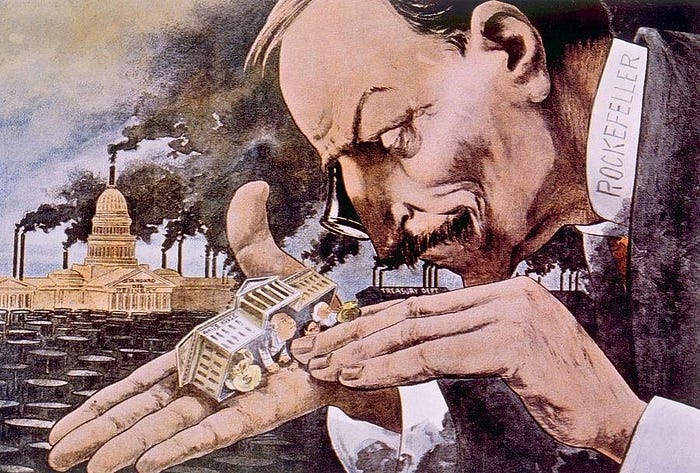We Should Not Endure a King
Antitrust is a political cause, not an economic one

If we will not endure a King as a political power we should not endure a King over the production, transportation, and sale of the necessaries of life. If we would not submit to an emperor we should not submit to an autocrat of trade with power to prevent competition and to fix the price of any commodity. — Senator John Sherman, 1890, arguing for the passage of the Sherman Act
Conservatism consists of exactly one proposition, to wit: There must be in-groups whom the law protects but does not bind, alongside out-groups whom the law binds but does not protect. — Frank Wilhoit, Crooked Timber
Whoever has the gold makes the rules. — Johnny Hart, The Wizard of Id.
People of the same trade seldom meet together, even for merriment and diversion, but the conversation ends in a conspiracy against the public, or in some contrivance to raise prices. — Adam Smith, An Inquiry into the Nature and Causes of the Wealth of Nations.
Dear Fellow Leftists,
Please don’t let the right trick you into thinking that they own antitrust.
Again.
The fight against commercial monopolies has its origins in the struggle for self-determination. Monopolized sectors, after all, have two powerful advantages:
- They are concentrated, which makes it easier for them to come to agreement on how to lobby governments; and
- They are highly profitable, because monopolists can screw their workers, suppliers and customers and get away with it.
Because they are profitable and concentrated, monopolies can:
- Arrive at a common lobbying position, and
- Spend that lobbying position into law.
Money, after all, is power, and concentrated money is concentrated power.

Anyone who has a stake in democratic governance — in letting people elect their leaders and hold them to account — should hate monopoly. Thomas Jefferson railed against the decision to exclude anti-monopoly from the Bill of Rights. When John Sherman rallied his fellow senators to vote for his landmark antitrust bill in 1890, he called monopolists “autocrats of trade,” comparing them to “kings” and “emperors.”
Jefferson and Sherman both understood that governments could not do the people’s bidding if wealth (and thus power) was gathered into a small number of hands.
The right hates antitrust.
As the political scientist Corey Robin wrote in The Reactionary Mind, the defining principle of all right-wing movements is the idea that some of us were born to rule and others (that is, most of us), to be ruled over.
Seen up close, different right-wing movements have different criteria for selecting the rulers. For monarchists, it’s being born royal. For industrialists, it’s being elevated by “the invisible hand.” For misogynists, it’s having a penis. For racists, it’s the color of your skin, or whether you were baptized, or circumcised, or want to go on a pilgrimage to Mecca.
But if you zoom out to ten thousand feet, you’ll see that all these right-wing movements share a fundamental belief: that fitness to rule is in the DNA. Maybe it’s the presence of a Y chromosome, and maybe it’s emerging from a lucky orifice, but it all boils down to the same thing: eugenics.
Antitrust is anti-eugenic. It’s about pluralizing power; about giving a veto to states over corporations. It’s true that some of those states aren’t democratically accountable (Xi Jinping is a formidable trustbuster), but states can be democratically accountable, unlike corporate cartels. By definition, the ground state of the corporation is autocracy.
One boss, one vote.
The right killed antitrust.
For most of its history, antitrust was a legislative guillotine for Sherman’s “Kings of the necessaries of life,” (metaphorically) decapitating industrialists who acquired unchecked power, and, crucially, intervening to block mergers and other maneuvers that would help them attain that power in the first place.
For decades, the Chicago School of economics fomented a surreal conspiracy theory about the true meaning of antitrust. They claimed that antitrust’s purpose was — and always had been — to prevent the formation of “inefficient” monopolies that raised prices or lowered quality.
They argued that most monopolies were “efficient” and that they produced “consumer welfare” and that the pursuit of antitrust for its own sake would deprive the world of the bounty of these efficiencies: the low prices and superior products that a “good” monopoly could produce.
The Chicago School proposed that monopolies should only be subject to regulation when they were mathematically, provably “inefficient.” They rejected the idea that we should prevent monopolies from forming, counseling us to wait and see whether a monopoly turned out to be “inefficient” before we trained our firepower on it.
They sold this fairy tale to Ronald Reagan (he was an easy sell) and to every president since. It helped that billionaires poured fortunes into supporting this nonsense-peddling.
Here’s how that worked out. Today, it is essentially impossible to pass a law, no matter how popular it is, if corporate interests oppose it. Even when antitrust enforcers train their firepower on monopolies, they are wildly overmatched, and must sustain their enforcement action for years or even decades before attaining a result (note that this is finally changing).
Don’t let them tell you that the point of antitrust is to increase competition. The point of antitrust is to increase accountability.
From its earliest days, the anti-monopoly movement has understood that while competition can make businesses more responsive to workers and customers and instill caution in firms contemplating overt acts of political corruption, not all competition is good competition. We don’t want a competition for which companies can abuse our human rights most efficiently.
The point of antitrust isn’t to make companies work better. It’s to make them fail better. It’s to ensure that abusive employers can’t buy off the NLRB, that payday lenders can’t buy off the CFPB, that polluting industrialists can’t buy off the EPA, that murderously reckless aerospace companies can’t buy off the FAA, that intergenerational pharma crime families can’t buy off the FDA.
It doesn’t matter if a monopoly is efficient. If we let rich people structure our lives — if we yield to the right’s eugenic insistence that some are born to rule, the rest to be ruled —we pay a price so high that it erases any “efficiency” gains.
In the short term, it’s “efficient” to build an apartment complex with no fire doors; to toss your waste into the street; to drive drunk rather than paying for a taxi.

This is a very efficient solution. For a while.
A benevolent dictatorship is very efficient, providing the dictator is:
a) benevolent, and
b) infallible.
Today, antitrust is undergoing a renaissance, with some genuinely bold ideas making real strides through our legislatures.
Some of that progress is thanks to the support of a rogue’s gallery of the most disgusting right-wing creatures ever to slime their way through Congress.
In light of this, you could be forgiven for thinking that antitrust is a reactionary, right-wing cause, but that would be wrong.
These same lawmakers never met a monopoly — and its super PAC — they didn’t like. Their highly selective support for antitrust is entirely driven by the deplatforming of Alex Jones, Milo Yiannopoulos, and Donald Trump. As Anil Dash puts it, they’re motivated by the pretense that “the ‘real problem’ is that the algorithm isn’t giving their shitty content unfair amplification.”
If Big Tech was to reinstate all the right-wing trolls and promise to open every board meeting with a solemn Stolen Likes Acknowledgement, these Republican trustbusters would instantly revert to cheerleading for monopolies.
It’s true: The tech antitrust movement does include some fair-weather friends who aren’t on board with a progressive vision for society.
From telecoms giants who want to shift some Big Tech profits to Big Telco; to entertainment giants who want to shift Big Tech profits to Big Content, there are a hell of a lot of fellow travelers out there betting that they can awaken antitrust from its 40-year coma and then put it back to sleep.
They’re wrong. The antitrust movement has more partisans than they know. From wrestling fans to everyone who wears glasses, from drinkers to anyone who’s ever bought something that came out of a shipping container, from journalists to nurses to musicians, we all suffer under monopoly.
Today, we endure “Kings over the production, transportation, and sale of the necessaries of life.” They are ripe for a revolutionary overthrow.
Cory Doctorow (craphound.com) is a science fiction author, activist, and blogger. He has a podcast, a newsletter, a Twitter feed, a Mastodon feed, and a Tumblr feed. He was born in Canada, became a British citizen and now lives in Burbank, California. His latest nonfiction book is How to Destroy Surveillance Capitalism. His latest novel for adults is Attack Surface. His latest short story collection is Radicalized. His latest picture book is Poesy the Monster Slayer. His latest YA novel is Pirate Cinema. His latest graphic novel is In Real Life. His forthcoming books include Chokepoint Capitalism: How to Beat Big Tech, Tame Big Content, and Get Artists Paid (with Rebecca Giblin), a book about artistic labor market and excessive buyer power; Red Team Blues, a noir thriller about cryptocurrency, corruption and money-laundering (Tor, 2023); and The Lost Cause, a utopian post-GND novel about truth and reconciliation with white nationalist militias (Tor, 2023).

